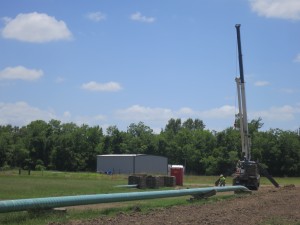Eminent Domain: How the Courts are Transforming Texas Land Rights

Photo by Dave Fehling/StateImpact Texas
Jefferson County Court at Law Judge Tom Rugg listens to arguments in a property rights case.
This is part three of a three-part series devoted to looking at efforts to overhaul eminent domain in Texas and what may come next for landowners, pipeline companies, and the oil and gas industry. Read Part One here and Part Two here.
At the O’Keefe’s farm outside of Beaumont, Texas, Dick and his sister Margaret O’Keefe stood by their front door on a muggy day this summer and watch a truck pull up the long dirt road into their neighbor’s field.
The truck was headed to work on the Crosstex NGL pipeline. This is a project that had declared itself a “common carrier,” a pipeline with the right to claim private property.
But after the pipeline was in the ground, a Beaumont judge found otherwise.
“They just claim it, and it’s up to the individual landowners to challenge them,” Dick O’Keefe said. “That’s where I think the state could do a better job of policing what the pipeline companies are doing.”
For landowners like Dick O’Keefe, lawmakers’ failure to create a system in which pipeline companies prove their right to claim land is deeply frustrating. The pipeline industry was also upset by inaction at the legislature, but for different reasons. It wanted rules that freed it from the prospect of multiple landowner lawsuits.
Others worry about the impact of inaction on the economy of Texas.
“We’re so dependent on oil and gas taxes and severance taxes and production taxes,” state Rep. Rene Oliveira (D-Brownsville), who tried to pass eminent domain reform in the 2013 legislative session, told StateImpact Texas. With more lawsuits, “it’s going to cost more and more money to build those pipelines, and we will see less pipelines being built.”
But there are plenty of people who think that the status quo is better than any of the changes that were on the table. That’s because of what those changes would have done to legal challenges against pipelines.
“All of the bills brought them to Travis County Court following the government code there, as opposed to continuing through that litigation process that would have allowed for it to remain in whichever court of appeals in their local area,” Norman Garza, with the Texas Farm Bureau, told StateImpact Texas.
It was that ability to fight pipelines at the ground level that groups like the Farm Bureau were trying to protect. As long as the status quo stands, it’s in those lawsuits at local courts that eminent domain law in Texas continues to evolve.
The Action at the Courts
To learn what legal challenges to Crosstex and other pipelines mean for eminent domain, I called Kent Sullivan. He’s served as a Judge in appellate and district courts in Texas. He now heads up the energy team for the Sutherland Law Firm. [Disclosure: Sutherland has supported programming on KUT Austin, a lead station for StateImpact Texas.]
Sullivan said a recent ruling in favor of TransCanada’s Keystone XL pipeline affirmed something very basic: Texas trial courts do have the power to rule if a pipeline is a common carrier. That means if a pipeline company is challenged at court, it had better come to trial with evidence, not just a state form claiming it can take land.
“The message to the pipelines is that you have to be better prepared and need to have your ducks in a row when approaching this kind of litigation. And that to some extent was the finding in the other case, the Crosstex case,” said Sullivan.
The Crosstex rulings went even further.
In that case, the judge found the company was not a common carrier because it didn’t prove it would make itself available for hire. The ruling also said the pipeline didn’t qualify to claim private land because it would transport natural gas liquids. The state’s Natural Resource Code specifies common carrier status for “crude petroleum” pipelines. A district court of appeals reaffirmed that ruling.
If that ruling stands, it could be a wrinkle in oil and gas industry plans to extract and transport historic amounts of natural gas liquids from the ground through hydraulic fracturing.
“Because that opinion clearly extended the products and the pipelines that would be covered. So anyone who thought they would be insulated (from lawsuits) was naive if the Supreme Court agrees with the Beaumont court,” State Rep. Rene Oliveira told StateImpact Texas.
“I think marginally, these [rulings] might advance the interests of landowners somewhat over that of pipelines,” said Sullivan.
Crosstex didn’t return calls for an interview. But many expect the company will appeal again. Meanwhile, other landowners and pipelines are facing off across the state. In North Texas, farmer Julia Trigg Crawford continues to fight the Keystone XL pipeline (with a ruling expecting in her appeal later this month). And another landowner in Collin County filed suit against the Seaway pipeline over its right to take land just this month.
With the number of lawsuits growing, one thing becomes more and more likely: that the Texas Supreme Court will again weigh in on eminent domain law.
Whatever that decision means for land rights, it will likely come too late for landowners like the O’Keefes. At their property, the pipeline is already in the ground.
“The leases have already been signed, the moneys been dispersed. It’s kind of after-the-fact at this point,” said Dick O’Keefe. “But it was with the threat of going to court. They beat us over the head with the threat to get us to settle up.”



